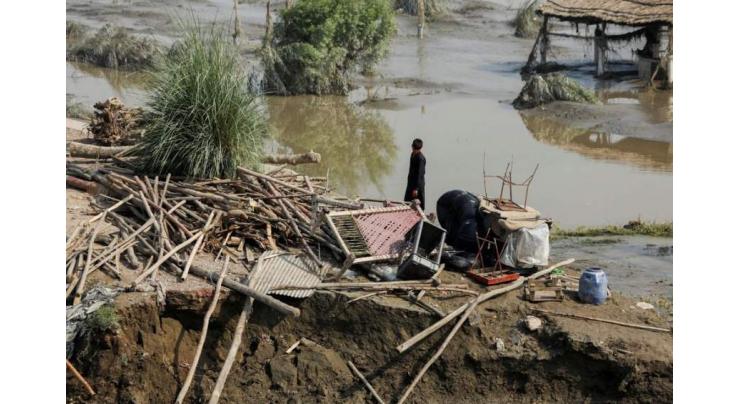
- Home
- Pakistan
- News
- Pakistan faces average cost of Rs136bln per annum due to natural disasters: Speakers
Pakistan Faces Average Cost Of Rs136bln Per Annum Due To Natural Disasters: Speakers
Sumaira FH Published April 08, 2024 | 07:35 PM

The Speakers at a validation session on financial flow and gap analysis of public finance for disaster preparedness and response said Pakistan faced an annual average cost of Rs136 billion due to natural disasters, necessitating a strategic shift towards anticipating their impacts rather than merely responding
ISLAMABAD, (UrduPoint / Pakistan Point News - 8th Apr, 2024) The Speakers at a validation session on financial flow and gap analysis of public finance for disaster preparedness and response said Pakistan faced an annual average cost of Rs136 billion due to natural disasters, necessitating a strategic shift towards anticipating their impacts rather than merely responding.
This imperative emerged from a participatory workshop organized by the Food and Agriculture Organization (FAO) of the United Nations in Islamabad. The workshop aimed to disseminate the Initial Findings of the Financial Flow and Gap Analysis of Public Finance for Disaster Preparedness and Response conducted by FAO Pakistan, a news release said.
The analysis seeks to facilitate specific advocacy and capacity-building steps essential for enabling national, provincial, and district-level systems to finance and support Anticipatory Actions (AA). With a focus on both national and sub-national levels, particularly in Sindh province, the study looked into government climate and disaster risk financing mechanisms, tools, and flows.
Janek Toepper, Climate Change and DRF Specialist, FAORAP, along with Syed Aftab Raza, Public Finance Management Consultant, presented key findings from the research analysis, shedding light on the Disaster Risk Finance for anticipatory action. Following this, Mubushar Hussain, Manager of Disaster Risk Reduction at NDRMF, discussed the Disaster Risk Financing Strategy and NatCat Model.
Emphasizing the necessity for collaborative efforts among public, private, and international stakeholders, speakers highlighted a growing financing gap in global humanitarian assistance, adversely impacting critical services like health, education, and social protection. With only 71% of the required funding received for humanitarian needs during the 2022 floods in Pakistan, they recommended urgent reforms in finance systems to address climate change risks effectively through anticipatory actions.
Experts presented examples from various countries, including Bangladesh, the Philippines, and Mongolia, showcasing how Pakistan can leverage available public funds for anticipatory actions. These funds encompass district contingency funds, provincial disaster management funds, budgetary reallocations, NDMF, Ministry of Finance contingency fund, and contingent credit or risk transfer mechanisms.
Earlier, Florence Rolle, FAO Representative, welcomed participants, highlighting the transformative potential of anticipatory action in humanitarian and development endeavors. Naeem Iqbal, ECHO-PPP Project Coordinator at FAOPK, introduced the ECHO – Pilot Programmatic Partnership project and Anticipatory Action approach, while Ms. Ana Dizon, Early Warning and AA Specialist at FAOPK, moderated the session.
Representatives from several government agencies, international organizations, and relevant stakeholders participated in the workshop including; the National Disaster Management Authority (NDMA), Asian Development Bank (ADB), Economic Affairs Division (EAD), Pakistan Meteorological Department (PMD), Ministry of Planning and Development, National Disaster Response Management Fund (NDRMF), United Nations Office for the Coordination of Humanitarian Affairs (UNOCHA), World Food Program (WFP), United Nations Development Program (UNDP), the German Red Cross, ACTED, UNESCO, Welthungerhilfe (WHH), Secours Islamique France (SIF), Italian Agency for Development Cooperation (AICS), Health and Nutrition Development Society (HANDS), Islamic Relief Pakistan (IRP), and Asian Disaster Preparedness Center (ADPC).
Related Topics
Recent Stories

Dubai Police Marks International Workers' Day with 'Talabat' Riders

Sharjah Ruler inaugurates 15th annual Sharjah Children’s Reading Festival

Parineeti Chopra opens up about her decision to marry politician Raghav Chadha

PCB decides to set up training camp for national team ahead of England, Ireland ..

Virat Kohli's sweet birthday wish for Anushka Sharma

Interior Minister commends Pakistan Coast Guards

Pakistan women’s squad announced for England tour

Punjab CM Maryam inaugurates initiative of field hospitals

PM Shehbaz constitutes committee to investigate caretaker govt’s wheat import ..

Women T20I: Pakistan to face West Indies in fourth match tomorrow

Pak-UK 6th Regional Stabilization Conference underway at NDU, Islamabad

World Labor Day being observed today
More Stories From Pakistan
-
IG inquires after health of injured police officials
4 hours ago -
Govt focuses on working class needs: Dastgir
6 hours ago -
Advocating for labour right is PPP’s legacy: Nasir Hussain
6 hours ago -
Massive rallies mark May Day in Rawalpindi
6 hours ago -
PM keen to resolve issues of farmers: Rana Tanveer
6 hours ago -
PDP holds protest in Srinagar against BJP regime’s divisive tactics in IIOJK
6 hours ago
-
Government committed to serve labourers at all cost: Rana Sana
7 hours ago -
Muqam visits graveyard of martyred soldier Azam Khan
7 hours ago -
Rich tributes paid to martyrs of Chicago
7 hours ago -
BLLFP stresses importance of enforcing minimum wage laws
7 hours ago -
President for strict action against criminals in Sindh
7 hours ago -
President orders strict action against criminals in Sindh
7 hours ago